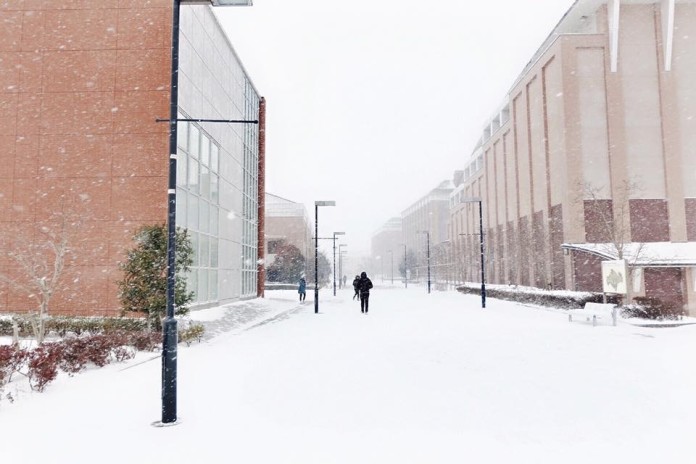Taking a university course during the holiday period may not sound appealing to many people. However, if you open yourself up to new experiences, you will never know what you can get. Indonesia Mengglobal Contributor Sadya Azzahra did just that: as part of her undergraduate study at Ritsumeikan Asia Pacific University (APU), Japan, she enrolled to a winter course that gave her a new perspective on cyber security, a subject she never thought she would be interested in before.
***
Walking through slippery roads and being hit by cold gusts of wind are my least favorite things about wintertime. Worst of all, sometimes it is also accompanied by the inevitable snowstorm on campus. Nevertheless, I attended a winter session this year as part of my undergraduate program in International Relations at APU. The session was called Violence and Terrorism, an intensive course taught by a visiting professor and held during the winter holiday. Despite being an unpopular option for students in APU, I decided to take this course because I needed to obtain all of my credits in time. In the end, it turned out that I got more than just credits, instead I gained a new perspective on an issue that I rarely even thought of.
Do you think it is appropriate for your friends or family to go through your phone? Did you know that someone can do this behind your back without even touching it? After learning about this, I was terribly surprised because as an international student who live far away from my family, along with a myriad of group activities, definitely made my phone indispensable. Some of us might have everything saved in our phones, from daily conversations with our relatives, to online test results from the hospital. That was why as a currently relevant topic, this winter course on cyber terrorism seemed to be very appealing.

This course showed me a multitude of jaw-dropping facts about the actions taken by different countries regarding cyber security. To prevent issues as severe as terrorism, which can potentially damage information technology systems and spread fear throughout society, I learned that governments from various countries have tried to tackle this problem through different means. Some of them have chosen to record internet traffic without warrant, others have preferred that they do not interfere with individual’s privacy. This brought me to me think about what the Indonesian government has done regarding this issue. Undoubtedly, our cyber activity is more complicated than we think; a simple Instagram post is not simple at all.
Something this class taught me the most was how to be more critical even to little unseen things surrounding me. The professor always urged the students to ask. The more we ask, the merrier. He explained that most people are not aware of the current cyber-world situation and might react negatively towards government actions, which may include us. For this reason, he required the students to do a research about their own country and write an opinion piece about it. Even though the research was difficult at first, discussing it with students coming from dozens of countries made it much more enticing and eye-opening.
This course made me realize the importance of governments’ role in regulating the cyber space while making me question how much governments should do (or not do). It is important to have clear written government regulations regarding private data within electronic transaction information. On one hand, it is my opinion that as a democratic country, the Indonesian government should respect the norms of democracy and not limit the political space of its citizens by recording their cyber activity. On that account, I suppose the government should not have right to access people’s internet traffic because everyone should have their own privacy and freedom of expression. If the government can access all society’s private conversation and activities, there is high potential for human rights violations, an infringement on an individual’s liberty.
On the other hand, if the government has the right to access any suspicious activities, some problems can be handled immediately. Although I disagree with government having access toward private internet traffic, to some extent, there might be several cases where government should be allowed. For instance, did you know the Indonesian Law Number 30 of 2002 regarding the Corruption Eradication Commission was written in a way that allows the institution to access the private cyber activity of a person even though the he or she has not been named a suspect? Do you think it should be justified?

Through the course’s discussions, role plays, and feedback, I feel that am now able to think more on how I could I give back to the society. Especially, helping others to make sure that security in our mindset.
Studying abroad has led me to think of cyber security issue from a unique perspective. Taking this course in Japan, taught by a professor from the United States, has ironically urged me to increase my awareness of the issues in my own country. After the United States’ Snowden controversy with the NSA and the worldwide spotlight it received, I wonder if there are more I should know about cyber security in Indonesia.
Overall, taking a course in a totally new area of study, even during a holiday period, can never go wrong. As this course helps the students to be updated with the world’s ongoing problem and enhance their motivation to bravely express their opinion about the cyber security, it was greatly mind-altering. This time, when all of our lives are within the digital world, everyone should be able to at least understand a simple cyber security for the sake of their own safety.
***
Photos provided by the author








